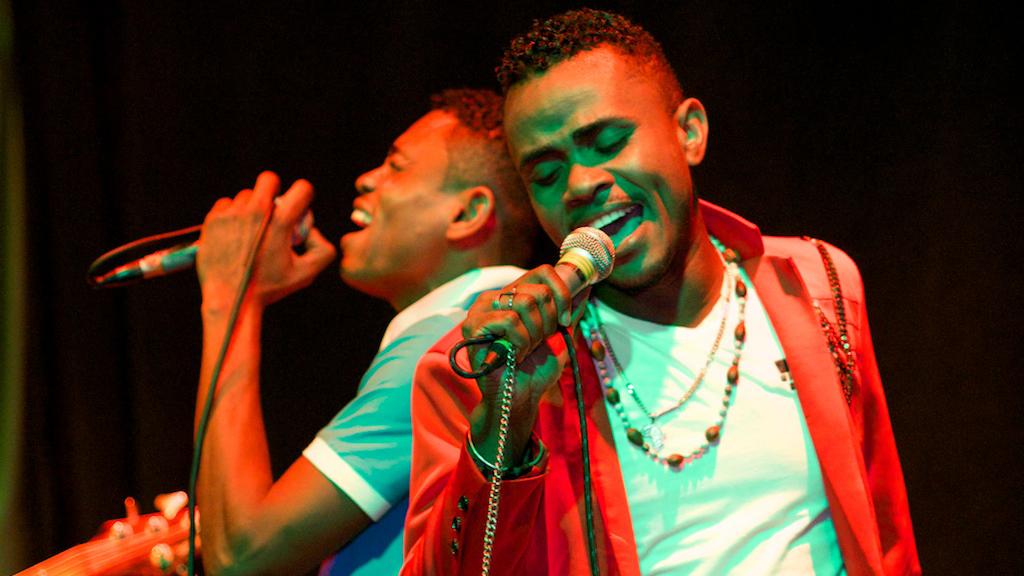Go inside salegy, the music that dominates Madagascar
Modern salegy artist Aly Mourad performs at Jao's Pub in Antananarivo, Madagascar. Mourad blends traditional salegy with a more upbeat style.
On any weekend night in Jao’s Pub, a popular nightspot in Antananarivo, Madagascar, you’ll find a lively scene: A dance floor filled with comfortably dressed men and women, mostly young, shimmying gracefully to the band’s upbeat 6/8 groove.
They occasionally break out in rhythmic clapping, or rombo. The band’s call-and-response vocals are strong and declamatory, but still as uplifting as the beat itself. Strains of accordions, tangling electric guitar lines, pumping bass and relentless rhythm blend together in unified symmetry. Musicians and dancers move as one.
If it’s a young band onstage, they play non-stop, each song morphing into the next and extending the collective trance long into the night. It’s a vibe you won’t find anywhere else but Madagascar. This is salegy.
Salegy has been one of the most popular dance music genres in Madagascar since the mid-20th century. People still associate the music with the northern coastal regions, just across the Mozambique Channel from East Africa, but today you can hear it anywhere on this vast island.
Salegy is grounded in older traditional rhythms, but it came of age in the hopeful years following World War II, when all sorts of indigenous music was being retrofitted for a new, modern age. One of salegy’s veteran champions is Eusebe Jaojoby, who began in a village singing traditional folk songs and sang in some of the first salegy bands formed in the northern city of Diego Suarez.
Jaojoby’s self-named band went on to rock Antananarivo in the 1970s and gain international fame in the ‘90s. Today Jaojoby owns and operates Jao’s Pub, and his band — or one of his family bands — plays there each Saturday night.
These days, young stars like Ali Mourad and Wawa dial back the fancy guitar work and crank up the tempo for a more youth-oriented sound. Artists like Tence Mena and Vaiavy Chilla go further still, fusing the classic sound with high-tech contemporary sounds from Africa, like coupé-decalé from Ivory Coast and ndombolo from Congo. They also create savvy, satirical music videos that critique modern life in this vibrant but politically and economically troubled island nation.
The videos here provide a rich entrée into the world of salegy. First, here’s a set of mostly live videos of Jaojoby from over the years:
Here’s another major bandleader of classic salegy, Lego. This 2013 video starts out in traditional mode, featuring percussion, accordion, and vocals:
To get a sense of salegy’s roots, here’s a video the Afropop team shot in Diego Suarez, in the north of Madgascar. Teenage accordionist and bandleader Candela leads an acoustic ensemble here, giving a sense of what the music might feel like in a down-home setting. This is field video, not a perfect recording, but what it lacks in technical polish it more than makes up in musicality and spirit.
These days in the northern city of Diego Suarez, young salegy artists are promoting a sound they call salegy gouma. It’s fast, energized and largely about interaction with the crowd. You’ll get the feel from this bit of live video Afropop shot at Jao’s Pub, Jaojoby’s nightclub in Antananarivo. The artist is Ali Mourad — sometimes Aly Mourady — from Diego Suarez.
Now to the contemporary sound of Tence Mena, who is currently one of the most successful popular singers in Madagascar. As noted above, Tence Mena has incorporated all sorts of foreign musical influences, but you can still hear that her roots lie in salegy.
Tence Mena makes some of the most creative music videos in Madagascar these days. Check out her song “Soa’G.” This is not technically salegy, but it shows how this young artist has expanded the genre’s parameters. "Soa" is a play on the word swag or swagger, but in Malagasy, it also means good or beautiful. G is "gasy," as in Malagasy. The message is to be proud of being Malagasy. Here’s the video, and it's well worth watching to the end!
In the Spring of 2014, a team of producers from PRI’s Afropop Worldwide journeyed to the Indian Ocean island of Madagascar, traveling across the country to gather material for a three-part radio series exploring the nation’s unique music and culture. To give you a taste of the show, Afropop senior producer Banning Eyre put together this musical guide to the program’s central musical genre, salegy. For more music from Madagscar, be sure to check out Afropop.org and subscribe to Afropop’s podcast.
